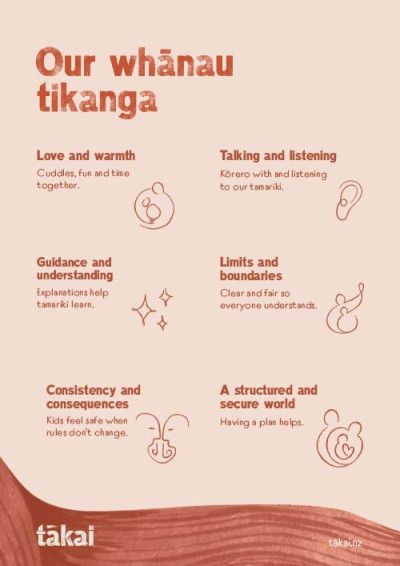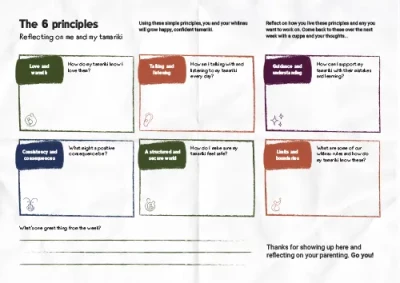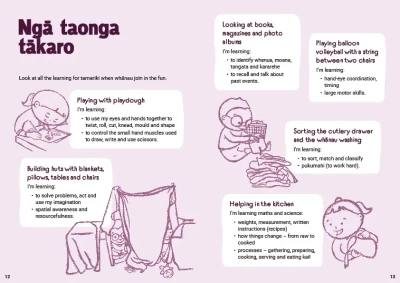
Behaviour, play and the 6 principles
After tamariki have started going to an early childhood service or school, they still need time to play alongside their parents or caregivers. Play is a great opportunity to put the 6 principles into action.
A child who feels loved and safe within their whānau is likely to accept the values and standards of behaviour their parents believe in. This sense of security can be developed simply through:
- playing and doing activities together
- understanding and incorporating the Tākai Six principles of effective discipline (ngā tohu whānau) in their parenting.
How does playing together help?
We’ve talked a lot about play in articles on this website, mainly concentrating on the benefits to the child’s learning and social growth. Play activities also provide enormous opportunities for parenting with the 6 principles.
Parents and children alike gain so much value and enjoyment from playing together, having fun and sharing attention. It’s a way for the adults in the child’s life to strengthen their relationship and use the 6 principles to help the child feel loved and safe.
Playing together is laying down positive foundations for behaviour and learning for this future happy and capable adult. It may be particularly relevant for foster carers or whānau caring for a child who has been taken away from their parents.
Help whānau avoid making the mistake of thinking that now that the child is at an early learning centre they don’t need the adult input to play anymore. They may be getting plenty of play experience with peers and teachers, however, when you’re building or rebuilding a relationship with the child it is especially important for the key adult in their life to be engaging with them through play.
Building strong relationships
Doing things together that you enjoy is a good place to start:
- gardening
- baking
- walking
- sitting on the beach
- watching sports
- reading
- playing cards
- swimming
- playing music
- drawing
- playing with sand
- mucking around in water
- modelling things out of dough or clay
- playing games that the adults remember enjoying in their whānau.
All activities done together promote a strong relationship between the tamaiti and their parent or caregiver. The richness of the activity lies in the interaction that occurs between the child and adult. This happens while the adult sits alongside the child as a companion or a playmate and takes the time and opportunity to build the relationship with them. The message adults can be giving is not, ‘Go away and play’, but ‘Come here, let’s play’.
Using the 6 principles
All activities enjoyed together involve using the 6 principles. Here’s an example. Under ‘Physical play’ in Whakatipu booklet Te Māhuri 1 (page 13), we read, ‘Playing balloon volleyball … teaches me about: using large motor skills.’
But what else can it provide?
- Love and warmth – enjoying playing together, probably laughing together, having fun.
- Talking and listening – talking about and agreeing on rules, keeping up a dialogue as the game progresses, using encouraging words, giving more positive than negative messages, providing instructional words and modelling listening.
- Guidance and understanding – learning ball-handling skills, and learning from a good role model about fairness, honesty, and good sportsmanship.
- Limits and boundaries – rules provide a structure to the game, things like removing precious items, turn taking, playing within the rules, and having as few rules as possible (but sticking to them).
- Consistency and consequences – the same rules apply throughout the game for all players, and parents’ words and actions need to match.
- Safe and secure world – being aware of creating a safe environment, making sure no one or nothing gets hurt.
And maybe there’s an extra opportunity to learn some resilience too, for example, if a balloon pops we have to learn to get over the fright and disappointment.
Playing together, laughing together and exploring together all help the caregiver-child relationship to strengthen.
‘A child needs encouragement, like a plant needs water.’
— Rudolf Dreikurs
 pdf 7 MB
pdf 7 MB













